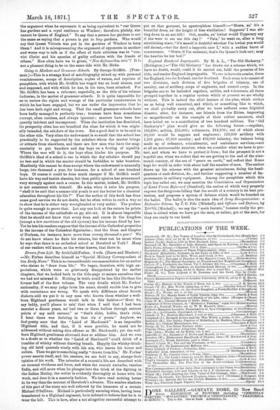Going to Markets and Grammar-Schools. By George Griffith. (Free- man.)—This
is a strange kind of autobiography mixed up with personal reminiscences, scraps of description, copies of verses, and reprints of pamphlets, with which Mr. Griffith has waged war on local abuses, real and supposed, and with which he has, in his turn, been attacked. For Mr. Griffith has been a reformer, especially, as the title of his volume indicates, in the matter of grammar-schools. It is quite impossible for as to review the rights and wrongs of the particular controversies in which he has been engaged, but we are under the impression that he has been both right and wrong. That the small grammar-schools have been badly managed is perfectly true ; trustees have been sometimes corrupt, often careless, and always ignorant ; masters have been fre- quently indolent and incompetent. When the institution has flourished, its prosperity often has not benefited the class for which it was origin- ally intended, the scholars of the town. Bat a good deal is to be said on the other side. Very often the endowment is so small that the school has practically to be supported by the scholars whom the master brings or attracts from elsewhere, and there are few men who have the mag- nanimity to pat boarders and day boys on a footing of equality. Where the man will do it, the boys often hinder his purpose. Mr. Griffith's ideal of a school is one in which the day Scholars should pay no fees and in which the master should be forbidden to take boarders. Manifestly this cannot be done except where the endowment is unusually large, two thousand a year, for instance, for a school of one hundred boys. Of coarse it could be done much cheaper if Mr. Griffith could have his way and banish classics, but then public opinion has pronounced very strongly against each a course. In this matter, indeed, Mr. Griffith is not consistent with himself. He asks, when it suits his purpose, "shall it be said that &commercial youth is not the batter for a classical education throughout his life ?" That the author of this book has done some good service we do not doubt, but he often writes in such a way as to show that he is either very wrongheaded or very unfair. The preface is quite enough to prove that. Let any one look at the return ho prints of the income of the cathedrals on pp. xiv.-xv. It is almost impossible that he should not know that every dean and canon in the kingdom (except a few survivors of the old system) has his income fixed by law. Yet he lets his readers suppose that the income of the Cathedral properties is the income of the Cathedral dignitaries ; that the Dean and Chapter of Durham, for instance, have more than seventy thousand a year! We do not know where he finds his returns, but what can he mean when he says that there is no cathedral school at Hereford or York ? Many of our readers will know, as the writer knows, that there is.


































 Previous page
Previous page